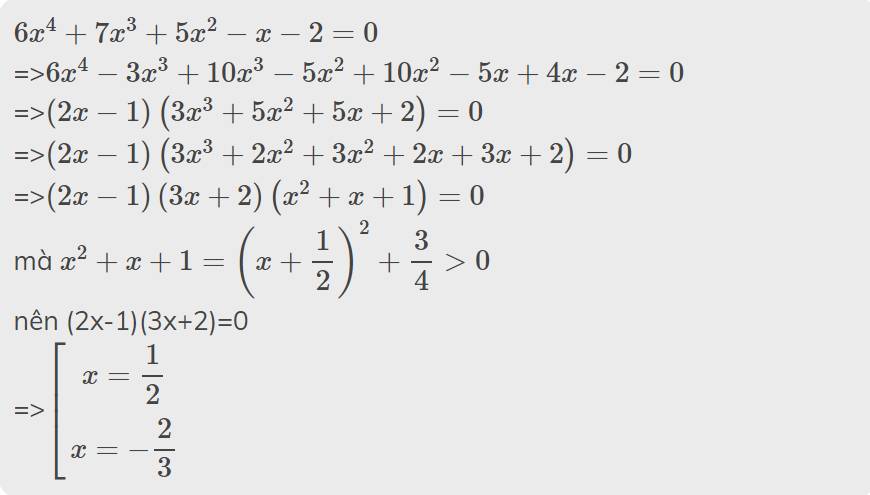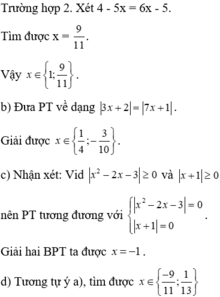giải phương trình 6x^4+7x^3+ 5x^2-x-2=0
Hãy nhập câu hỏi của bạn vào đây, nếu là tài khoản VIP, bạn sẽ được ưu tiên trả lời.



a: =>3x^2-3x-2x+2=0
=>(x-1)(3x-2)=0
=>x=2/3 hoặc x=1
b: =>2x^2=11
=>x^2=11/2
=>\(x=\pm\dfrac{\sqrt{22}}{2}\)
c: Δ=5^2-4*1*7=25-28=-3<0
=>PTVN
f: =>6x^4-6x^2-x^2+1=0
=>(x^2-1)(6x^2-1)=0
=>x^2=1 hoặc x^2=1/6
=>\(\left[{}\begin{matrix}x=\pm1\\x=\pm\dfrac{\sqrt{6}}{6}\end{matrix}\right.\)
d: =>(5-2x)(5+2x)=0
=>x=5/2 hoặc x=-5/2
e: =>4x^2+4x+1=x^2-x+9 và x>=-1/2
=>3x^2+5x-8=0 và x>=-1/2
=>3x^2+8x-3x-8=0 và x>=-1/2
=>(3x+8)(x-1)=0 và x>=-1/2
=>x=1

1/ \(x^3-7x+6=0\)
\(\Leftrightarrow x^3+3x^2-3x^2-9x+2x+6=0\)
\(\Leftrightarrow x^2\left(x+3\right)-3x\left(x+3\right)+2\left(x+3\right)=0\)
\(\Leftrightarrow\left(x+3\right)\left(x^2-3x+2\right)=0\)
\(\Leftrightarrow\left(x+3\right)\left(x^2-x-2x+2\right)=0\)
\(\Leftrightarrow\left(x+3\right)\left[x\left(x-1\right)+2\left(x-1\right)\right]=0\)
\(\Leftrightarrow\left(x+3\right)\left(x-1\right)\left(x+2\right)=0\)
\(\Leftrightarrow\)\(x+3=0\)
hoặc \(x-1=0\)
hoặc \(x+2=0\)
\(\Leftrightarrow\)\(x=-3\)
hoặc \(x=1\)
hoặc \(x=-2\)
Vậy tập nghiệm của phương trình là : \(S=\left\{-3;1;-2\right\}\)
2/ \(x^3-6x^2-x+30\)
\(\Leftrightarrow x^3+2x^2-8x^2-16x+15x+30=0\)
\(\Leftrightarrow x^2\left(x+2\right)-8x\left(x+2\right)+15\left(x+2\right)=0\)
\(\Leftrightarrow\left(x+2\right)\left(x^2-8x+15\right)=0\)
\(\Leftrightarrow\left(x+2\right)\left(x^2-3x-5x+15\right)=0\)
\(\Leftrightarrow\left(x+2\right)\left[x\left(x-3\right)-5\left(x-3\right)\right]=0\)
\(\Leftrightarrow\left(x+2\right)\left(x-3\right)\left(x-5\right)=0\)
\(\Leftrightarrow\)\(x+2=0\)
hoặc \(x-3=0\)
hoặc \(x-5=0\)
\(\Leftrightarrow\)\(x=-2\)
hoặc \(x=3\)
hoặc \(x=5\)
Vậy tập nghiệm của phương trình là :\(S=\left\{-2;3;5\right\}\)
3/ \(x^3-9x^2+6x+16=0\)
\(\Leftrightarrow x^3+x^2-10x^2-10x+16x+16=0\)
\(\Leftrightarrow x^2\left(x+1\right)-10x\left(x+1\right)+16\left(x+1\right)=0\)
\(\Leftrightarrow\left(x+1\right)\left(x^2-10x+16\right)=0\)
\(\Leftrightarrow\left(x+1\right)\left(x^2-8x-2x+16\right)=0\)
\(\Leftrightarrow\left(x+1\right)\left[x\left(x-8\right)-2\left(x-8\right)\right]=0\)
\(\Leftrightarrow\left(x+1\right)\left(x-8\right)\left(x-2\right)=0\)
\(\Leftrightarrow\)\(x+1=0\)
hoặc \(x-8=0\)
hoặc \(x-2=0\)
\(\Leftrightarrow\)\(x=-1\)
hoặc \(x=8\)
hoặc \(x=2\)
Vậy tập nghiệm của phương trình là :\(S=\left\{-1;8;2\right\}\)
4/ Đề bài sai ! Sửa lại nhé :
\(2x^3-x^2+5x+3=0\)
\(\Leftrightarrow2x^3+x^2-2x^2-x+6x+3=0\)
\(\Leftrightarrow x^2\left(2x+1\right)-x\left(2x+1\right)+3\left(2x-1\right)=0\)
\(\Leftrightarrow\left(2x+1\right)\left(x^2-x+3\right)=0\)
\(\Leftrightarrow\orbr{\begin{cases}2x+1=0\\x^2-x+3=0\end{cases}}\)
\(\Leftrightarrow\orbr{\begin{cases}x=-\frac{1}{2}\left(tm\right)\\\left(x-\frac{1}{2}\right)^2+\frac{11}{4}=0\left(ktm\right)\end{cases}}\)
Vậy tập nghiệm của phương trình là : \(S=\left\{-\frac{1}{2}\right\}\)

2:
a: =>2x^2-4x-2=x^2-x-2
=>x^2-3x=0
=>x=0(loại) hoặc x=3
b: =>(x+1)(x+4)<0
=>-4<x<-1
d: =>x^2-2x-7=-x^2+6x-4
=>2x^2-8x-3=0
=>\(x=\dfrac{4\pm\sqrt{22}}{2}\)

a) ( 3.x + 1 ) . ( 7.x + 3 ) = (5.x-7 ) . ( 3.x + 1 )
<=> ( 3.x + 1 ) . ( 7.x + 3 ) - ( 5.x - 7) . ( 3.x + 1 ) = 0
<=> ( 3.x + 1 ) . ( 7.x + 3 - 5.x + 7 ) = 0
<=> ( 3.x + 1 ) . ( 2.x + 10 ) = 0
<=> \(\orbr{\begin{cases}3.x+1=0\\2.x+10=0\end{cases}\Leftrightarrow\orbr{\begin{cases}x=\frac{-1}{3}\\x=-5\end{cases}}}\)
Vậy x = { \(\frac{-1}{3};-5\)}
b) x2 + 10.x + 25 - 4.x . ( x + 5 ) = 0
<=> ( x + 5 )2 -4.x . (x + 5 ) = 0
<=> ( x+ 5 ) . ( x + 5 - 4.x ) = 0
<=> ( x + 5 ) . ( 5 - 3.x ) = 0
<=> \(\orbr{\begin{cases}x+5=0\\5-3.x\end{cases}\Leftrightarrow\orbr{\begin{cases}x=-5\\x=\frac{5}{3}\end{cases}}}\)
Vậy x = \(\left\{\frac{5}{3};-5\right\}\)
c) (4.x - 5 )2 - 2. ( 16.x2 -25 ) = 0
<=> ( 4.x-5)2 -2 .( 4.x-5) .( 4.x + 5 ) = 0
<=> ( 4.x -5 )2 - ( 8.x+ 10 ) . ( 4.x -5 ) = 0
<=> ( 4.x -5 ) . ( 4.x-5 - 8.x - 10 ) = 0
<=> ( 4.x - 5 ) . ( -4.x - 15 ) = 0
<=> \(\orbr{\begin{cases}4.x-5=0\\-4.x-15=0\end{cases}\Leftrightarrow\orbr{\begin{cases}x=\frac{5}{4}\\x=\frac{-15}{4}\end{cases}}}\)
Vậy x = \(\left\{\frac{5}{4};\frac{-15}{4}\right\}\)
d) ( 4.x + 3 )2 = 4. ( x2 - 2.x + 1 )
<=> 16.x2 + 24.x + 9 - 4.x2 + 8.x - 4 = 0
<=> 12.x2 + 32.x + 5 =0
<=> 12. ( x +\(\frac{1}{8}\) ) . ( x + \(\frac{5}{2}\)) = 0
<=> \(\orbr{\begin{cases}x+\frac{1}{6}=0\\x+\frac{5}{2}=0\end{cases}\Leftrightarrow\orbr{\begin{cases}x=\frac{-1}{6}\\x=\frac{-5}{2}\end{cases}}}\)
Vậy x = \(\left\{\frac{-1}{6};\frac{-5}{2}\right\}\)
e) x2 -11.x + 28 = 0
<=> x2 -4.x - 7.x + 28 = 0
<=> ( x - 7 ) . ( x - 4 ) = 0
<=> \(\orbr{\begin{cases}x-7=0\\x-4=0\end{cases}\Leftrightarrow\orbr{\begin{cases}x=7\\x=4\end{cases}}}\)
Vậy x = { 4 ; 7 }
f ) 3.x.3 - 3.x2 - 6.x = 0
<=> 3.x. ( x2 -x - 2 ) = 0
<=> 3.x. ( x - 2 ) . ( x + 1 ) = 0
<=> \(\orbr{\begin{cases}x-2=0\\x+1=0\end{cases}\Leftrightarrow\orbr{\begin{cases}x=2\\x=-1\end{cases}}}\)
\([x=0\) \([x=0\)
( Lưu ý :Lưu ý này không cần ghi vào vở : Chị nối 2 ý đó làm 1 nha cj ! )
Vậy x = { 2 ; -1 ; 0 }

a, (3x+1)(7x+3)=(5x-7)(3x+1)
<=> (3x+1)(7x+3)-(5x-7)(3x+1)=0
<=> (3x+1)(7x+3-5x+7)=0
<=> (3x+1)(2x+10)=0
<=> 2(3x+1)(x+5)=0
=> 3x+1=0 hoặc x+5=0
=> x= -1/3 hoặc x=-5
Vậy...
a) (3x - 2)(4x + 5) = 0
⇔ 3x - 2 = 0 hoặc 4x + 5 = 0
1) 3x - 2 = 0 ⇔ 3x = 2 ⇔ x = 2/3
2) 4x + 5 = 0 ⇔ 4x = -5 ⇔ x = -5/4
Vậy phương trình có tập nghiệm S = {2/3;−5/4}
b) (2,3x - 6,9)(0,1x + 2) = 0
⇔ 2,3x - 6,9 = 0 hoặc 0,1x + 2 = 0
1) 2,3x - 6,9 = 0 ⇔ 2,3x = 6,9 ⇔ x = 3
2) 0,1x + 2 = 0 ⇔ 0,1x = -2 ⇔ x = -20.
Vậy phương trình có tập hợp nghiệm S = {3;-20}
c) (4x + 2)(x2 + 1) = 0 ⇔ 4x + 2 = 0 hoặc x2 + 1 = 0
1) 4x + 2 = 0 ⇔ 4x = -2 ⇔ x = −1/2
2) x2 + 1 = 0 ⇔ x2 = -1 (vô lí vì x2 ≥ 0)
Vậy phương trình có tập hợp nghiệm S = {−1/2}
d) (2x + 7)(x - 5)(5x + 1) = 0
⇔ 2x + 7 = 0 hoặc x - 5 = 0 hoặc 5x + 1 = 0
1) 2x + 7 = 0 ⇔ 2x = -7 ⇔ x = −7/2
2) x - 5 = 0 ⇔ x = 5
3) 5x + 1 = 0 ⇔ 5x = -1 ⇔ x = −1/5
Vậy phương trình có tập nghiệm là S = {−7/2;5;−1/5}

